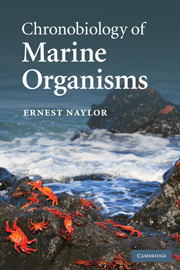Book contents
- Frontmatter
- Contents
- Preface
- 1 Moonshine
- 2 Biorhythms of coastal organisms
- 3 Tidal and daily time-cues
- 4 Clocks and compasses
- 5 Lunar and semilunar biorhythms
- 6 Annual biorhythms
- 7 Plankton vertical migration rhythms
- 8 Staying put in estuaries
- 9 Ocean drifters
- 10 Living clockwork
- References
- Author index
- Subject index
- Plate section
Preface
Published online by Cambridge University Press: 05 June 2012
- Frontmatter
- Contents
- Preface
- 1 Moonshine
- 2 Biorhythms of coastal organisms
- 3 Tidal and daily time-cues
- 4 Clocks and compasses
- 5 Lunar and semilunar biorhythms
- 6 Annual biorhythms
- 7 Plankton vertical migration rhythms
- 8 Staying put in estuaries
- 9 Ocean drifters
- 10 Living clockwork
- References
- Author index
- Subject index
- Plate section
Summary
There is increasing recognition of chronobiology in our understanding of the time-base of ecology, behaviour and physiology of plants and animals. However, much of the scientific effort so far in this field of study has focussed on daily and seasonal rhythmicity associated with solar periodicity of the environment. Impressively, this has led to the concept of heritable circadian biological clocks and a search for their molecular basis in the genetic makeup of living systems. Partly because of early and perhaps lingering scepticism, the possibility that some organisms might also innately phase their behaviour to lunar events has lagged behind as a field of study. Yet, living organisms in many seas and coasts are repeatedly exposed to lunar cycles, indirectly through oscillations of ocean tides. Moreover, marine animals and plants have been in existence for greater lengths of evolutionary time than have the terrestrial organisms that are often the material for classical studies of circadian rhythmicity. It is therefore reasonable to consider the extent to which marine organisms have adapted to tidal oscillations driven by lunar gravity, and also to ask whether lunar and semilunar events exhibited by such organisms are related to fortnightly variations in tidal height or even to moonlight cycles directly. Accordingly, alongside the concept of circadian and circa-annual rhythms in marine organisms, it is necessary to consider the existence of innate biological clocks of circatidal, circasemilunar and circalunar periodicities.
- Type
- Chapter
- Information
- Chronobiology of Marine Organisms , pp. ix - xPublisher: Cambridge University PressPrint publication year: 2010



